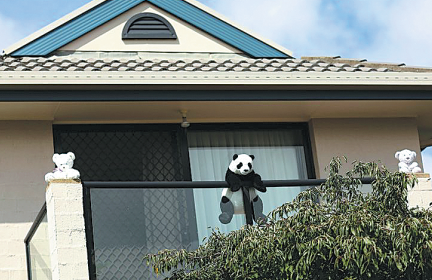Hunting for bears and happiness amid the epidemic


"They're at home, and they're bored," she says.
"So, this has been a really good incentive to get them out and active, and also keep them happy." So, she decided she and her daughters should also put two big pink bears outside their door.
She also made 60 printouts she hopes to distribute in the neighborhood of Harrison in northern Canberra to encourage more houses to participate.
Dozens of meters from their home, Trish Murfett's daughter has placed nine toys in her window, including ponies, cats, bears and Australian toys like a bilby.
Murfett has chronic lung disease and, according to the advice of the Australian government, should avoid going out. Her daughter in year 5 and husband are also staying home.
She also found out about the event from Facebook, where she said there was a map on the My Gungahlin page to show where the different teddy bears are.
"We thought it was a great idea," she says.
"We went around the neighborhood and explored the local houses that were nearby, and we decided to take part."
She planned to display different toys for different occasions. The next will fall on April 25, Anzac Day, an important national event marking the anniversary of the first major military action by Australia and New Zealand during World War I. Mass commemoration events were canceled due to the COVID-19 outbreak, but Murfett says she would pop up some "defense" teddy bears.
She hopes the toys bring joy to kids.
"It just allows them to have a bit of lighthearted relief to enjoy some teddies. And hopefully exploring around the neighborhood they see other teddies, and it creates a bit of an adventure for kids who are dealing with really uncertain circumstances at the moment."
Some Chinese families have participated.
Wang Jiao first learned about the bear hunt from New Zealand.
"The bears began coming out in the last couple of weeks, and they really bring hope for children confined to their homes," says the 45-year-old father of two.
"It is a very interesting idea, so that the bears, which would otherwise be sleeping at home, could greet passers-by," he says.
"Children would love this."
Wang says that children are experiencing cabin fever.
"They became irritable, putting their parents working at home under tremendous pressure."
Four bears stood on a rock outside his house, bathing in the sun, while his daughter and son, 11 and 9, respectively, were smiling after they'd completed their mission. The father says that now he feels relieved, too.
Wang says they are now taking extra precautions, such as washing their hands more often.
"I hope that everyone could keep a normal state of mind," he says.
"The crisis will become the past anyway. You may feel distressed, but you have to face the difficulties."
Murfett says they are using gloves and sanitizers when loading up the car and using shopping carts and baskets.
"We hope that everyone can really heed the advice of medical providers ... so we can minimize the risks," she says.
"This is a new normal for a period of time. And hopefully we will come through it with all our loved ones and friends and everyone else."
McCoy says she would like to thank the healthcare workers and everyone looking after the communities.
"My wish is just for everyone to remain safe, and we can go back to our normal lives as soon as possible."




































